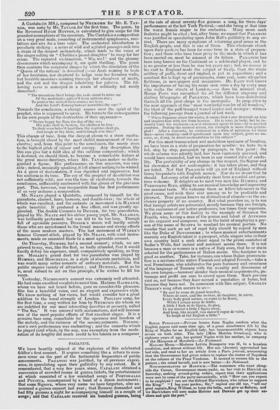PAGANINI.
WE have heartily rejoiced at the explosion of this celebrated fiddler's first concert. It augurs something like a return to com- mon sense on the part of the fashionable frequenters of public amusements. PAGANINI was justified, by all previous experi- ence, in speculating upon their gullibility to any extent. Be it remembered, that a very few years since, CATALAIII obtained a succession of crowded rooms at guinea tickets, the entertainment at which consisted of a few wretched songs of PORTOGALLO and PUCITTA, accompanied by a band of a dozen instruments ; that some Signora, whose very name we have forgotten, also an- nounced a guinea concert last year; that ROSSINI demanded and had fifty guineas a night for accompanying himself in a couple of songs; and that CATALANI received six hundred guineas, being at the rate of about seventy-five guineas a song, for three days' performance at the last York restival,—and she being at that time the worst female singer in the orchestra. Many more such fooleries might be cited ; but, after these, we repeat that PAGANINI was justified in speculating upon John Bull's gullibility to any ex- tent. There are many symptoms of returning good sense in the English people, and this is one of them. This wholesale attack upon their pockets has been for sonic time in a state of prepara- tion ; and those who have been privy to the.mode in which it has been carried on, must be amused at its failure. PAGANINI has been long known on the Continent as a celebrated player, and he is no greater or less than he was ten years ago ; but, no sooner is his visit to England made the subject of treaty, than the whole artillery of puffs, direct and implied, is put in requisition ; and a constant fire is kept up of paragraphs, some real, some altogether fictitious, in newspapers and magazines. Dr. EADY well knows the importance of having his name seen once a day by every man who walks the streets of London,—so does his musical rival. Hence Paris was ransacked for all the different sixpenny and shilling lithographs Of PAGANINI, which have been distributed through all the print-shops in the metropolis. In prop:xtion to the near approach of this" most wonderful wonder of all wonders," the blast of the puff-trumpet waxed louder and stronger : witness the following passage from a journal of last week.
"When Paganini seizes the violin, it seems that a star descends on him
and inspires him with fire from heaven. He is weak in body, but he. in- stantly loses his weakness—a new existence opens to him—he is another creature. During the musical action, his strength is more than quintu- pled! After a concerto, he continues in a state of agitation- for three days—never sleeping—and if questioned upon any subject, gives no an- swer, or, if any, in direct contradiction to the subject."
For this most transcendant and matchless specimen of humbug,
we have been in a state of preparation for months: we have been led, step by step, paragraph by paragraph, to this point : the whole scheme was adroitly laid, has been vigorously pursued, and would have succeeded, had we been in our wonted state of credu- lity. The probability of any change in this respect, the Signor and his showman did not contemplate : it has taken place, and they are foiled. Not that PAGANINI will go out of England without lining his pockets with English money. Nor do we desire that he should. Let every artist of celebrity meet here a cordial and gene- rous welcome. It deli,ghts us to meet two men like HUMMEL and FERDINAND RIES, adding to our musical knowledge and improving our musical taste. We welcome them as fellow-labourers in the good cause, and wish their visit among us to be profitable and pleasant. True genius knows no distinction of climate—is the ex- clusive property of no country. But what provokes us, is to see that foreign artists are patronized, merely because they are foreign, to the exclusion of our native professors, ten times their superiors. We place some of this foolery to the example of GEORGE the Fourth, who, having a man of the genius and talent of ATTWOOD as his organist and composer, was in the habit of employing a per- son of the name of SCAPPA to conduct his musical parties. No wonder that such an act of regal folly should be copied by men like the Duke of DEVONSHIRE; to whose musical entertainments scarcely any English talent is a passport, while singers who in their own country hold a rank about equal to the primi cantatori of Sadler's Wells, find instant and constant access there. It is not because a man or woman is a native of Italy even, that he or she is selected for the performance of Italian music. One foreigner is as Good as another. " Take, for instance, one whose Italian pronuncia- tion is a mixture of his native Flemish and adopted French,—take a real Frenchman, who adulterates the pure harmony and sweetness of the language of Tuscany with the nasality and dissonance of his own tongue,—however slender their musical acquirements, pa- tronage and profit are sure to crowd upon them. Such persons visit us, not because they have earned a reputation at home, but because they have not. In connexion with this subject, CHARLES DIBDIN'S song often occurs to us- " By and by come de grand benefice,
Where de aunt, and the mother, de (laughter, de niece, Every body good nature, so come to be fleece, While I scrape away de fiddle. A little I flash at de Opera, de play, -In my shariot a little I figure away, And keep, like myself, von damn'd rogue de valet, To laugh atthe English a little."


























 Previous page
Previous page